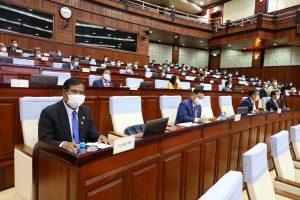As expected, Cambodia’s parliament yesterday approved an amendment to the country’s constitution barring Cambodians with dual citizenship from holding high government office. Under the new rules, the country’s prime minister, and the presidents of the National Assembly, Senate, and Constitutional Council, must be sole Cambodian citizens.
The vote took place a mere three weeks after the idea was first conjured by Prime Minister Hun Sen, following a report in The Guardian claiming – incorrectly – that the Cambodian leader had purchased Cypriot citizenship. Despite The Guardian later correcting the claim, it was quickly taken up by exiled opposition leader Sam Rainsy, who also referenced an earlier Reuters report claiming that several members of Hun Sen’s inner circle, including one of his nieces, had applied for or received Cypriot passports.
There was no doubt that the changes, which the government said were meant to show officials’ loyalty to their homeland and avoid “foreign interference,” would pass; Hun Sen’s Cambodian People’s Party (CPP) holds all 125 seats in the National Assembly, and the passage of the law through the Senate and its signature into law by King Norodom Sihamoni can be regarded as equally foregone conclusions.
The amendments form the latest page in a quarter-century-long rivalry between Hun Sen and Rainsy. On Facebook earlier this month, Rainsy claimed that the constitutional changes were designed to keep him from holding the post of prime minister. He said they were “custom-tailored to target me, as Hun Sen made it clear that as a reprisal against me, he wants to definitely block me from the premiership.”
While from Hun Sen’s perspective that will definitely be a benefit of the changes, it is likely subordinate to the goal of countering the claim that Hun Sen held a second passport himself.
The main motivation has to do with domestic political perceptions. Hun Sen has for years contrasted his own sole citizenship with his opponents, many of whom hold U.S. or French or Australian passports due to time spent as exiles or refugees, accusing them of having one foot in Cambodia and another in foreign countries. As I noted at the time, the allegation that Hun Sen had taken Cypriot citizenship “would have demolished one of the primary pillars of his claim to political legitimacy” and thus made necessary rapid action to quash the suggestion.
Indeed, the rapidity of the amendment’s passage from conception to passage – to say nothing of the barrage of indignant letters that Phnom Penh dashed off to The Guardian and to the government of Cyprus in response to the report about Hun Sen’s citizenship – is a sign of just how sensitive this question is for Cambodia’s leader.
Of course, the new constitutional tweaks do also provide a handy way for Hun Sen to foreclose the involvement of many leading opposition members from senior posts. After all, the CPP government’s actions over the past five years – a period in which it has banned Rainsy’s Cambodia National Rescue Party, arrested its other leader Kem Sokha on charges of treason, and engineered a wide-ranging crackdown on civil society and the independent press – shows that Hun Sen has no intention of letting Rainsy or any other of his opponents within a mile of the prime ministership.

































